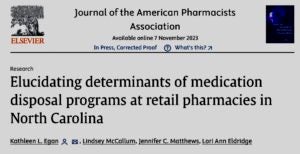Collaborative research on medication disposal opportunities
Collaborative research has focused on the role of medication disposal programs in the potential to reduce opioid and prescription drug misuse in communities.
A recent study conducted by Dr. Kathleen Egan from the Department of Implementation Science at Wake Forest University School of Medicine, Drs. Jennifer Mathews and Lori Ann Eldridge from the Department of Health Education and Promotion in the East Carolina University College of Health and Human Performance, and project manager in HHP, Lindsey McCallum, found that 32.3% of pharmacies in Pitt County have a disposal box for community members to dispose of their unused medication. Eldridge and Egan also are set to build on this work by assessing the implementation of pharmacy-based medication disposal programs on a national scale.

The Journal of the American Pharmacists Association published a paper about this recent research. Lindsey McCallum and Dr. Kathleen Egan spoke with representatives at pharmacies in Pitt County to gain insight on critical factors influencing medication disposal programs in North Carolina pharmacies.
Using findings of the recent research study, Egan served as lead author, in collaboration with Matthews, Eldridge and McCallum, in the publication of the paper, “Elucidating Determinants of Medication Disposal Programs at Retail Pharmacies in North Carolina.” Egan and McCallum spoke with representatives at pharmacies in Pitt County to gain insight on critical factors influencing medication disposal programs in North Carolina pharmacies. All pharmacists, even those who worked at pharmacies without a medication disposal box, recognized the benefits of disposal boxes and believed medication disposal falls within their purview.
“Proper disposal of medications is something that is very important to all pharmacies, however, many of the pharmacies are not able to put a lot of effort and time into promoting proper disposal of medications because they are overrun with other more important tasks, such as filling prescriptions and helping customers,” McCallum said. “I think the work done on this project identified the significant need for more education on medication disposal in the community and the need for increased access to disposal boxes in community pharmacies.”
Professional development was a unique aspect of this research study. Following graduation at ECU, McCallum was hired as a program coordinator at ECU for a four-year grant from The Duke Endowment.
“I learned so much about how research projects start, to how data is collected, managed and analyzed, and finally to how the results of the project are finalized and disseminated via journal articles,” said McCallum, who in her current position is building on community partnerships and outreach opportunities to help expand trauma-informed care in eastern North Carolina. “I am thankful to have had this opportunity to be a part of this entire research project and it brings me great pride to see that our work on this project is being noticed, now published, and hopefully one day will have a significant impact on improving the medication disposal programs in eastern North Carolina and beyond.”
The researchers call for further investigation into the cost-effectiveness of scaling up the implementation of disposal boxes in community pharmacies.
Eldridge and Egan will continue to collaborate on a National Institute on Drug Abuse (NIDA) National Institutes of Health (NIH) R03 grant titled, “Assessing Implementation of Pharmacy-Based Medication Disposal Programs: National Estimates, Neighborhood Inequities, and Determinants of Implementation.” The grant spans from 2023 to 2025. Research will focus on estimating the prevalence of disposal boxes in pharmacies across the United States, evaluating the accessibility of these disposal boxes to diverse community members and identifying the determinants of implementation.
The initial pharmacy research initiative was made possible through a Comprehensive Addiction and Recovery Act (CARA) Local Drug Crises Grant awarded to ECU and the Pitt County Coalition on Substance Use (PCCSU) aimed to combat youth opioid and prescription drug misuse by transforming the culture around their acceptability. The Pitt County Coalition on Substance Use maintains a list of pharmacies that have a medication disposal box in Pitt County so community members can stay informed about where they can take their unused or expired medication.





